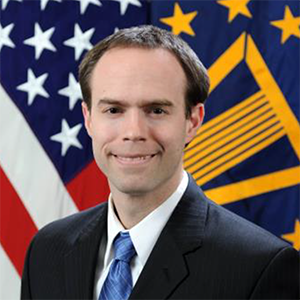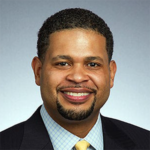

 Phil Carrai
Phil Carrai
Phil Carrai is President of the Space, Training and Cybersecurity division of Kratos Defense and Security Solutions, Inc, where he is responsible for all aspects of business operations, sales, mergers and acquisitions. Kratos Defense is an approximately $650 million public company focusing in Aerospace and Defense products and services.
 Brig Gen. Steve Butow
Brig Gen. Steve Butow
Steve “Bucky” Butow is the Director of the Space Portfolio at the Defense Innovation Unit (DIU). He joined the team in 2015 as an early plank owner when DIU was known as the Defense Innovation Unit Experimental (DIUx) and helped establish the organization’s operating locations in Silicon Valley; Boston, Massachusetts; and Austin, Texas.
Prior to joining DIU, Butow was the Vice Chief of the Joint Staff, California Military Department with responsibilities including cybersecurity, incident awareness and innovation. He is a former Commander of the 129th Rescue Wing at Moffett Federal Airfield, CA, where his responsibilities included organizing, training, equipping, and maintaining 970 combat-ready forces and $1 Billion dollars of MC-130P aircraft, HH-60G
helicopters and special mission equipment supporting the U.S. Air Force’s combat rescue and personnel recovery missions. He has additionally served as the Deputy Director of the Joint Search and Rescue Center for U.S. Central Command in 2005, and as Chief of Personnel Recovery for U.S. Air Forces Central in 2007 supporting Operations IRAQI and ENDURING FREEDOM. He has more than 3,500 flying hours in T-37, T-38, C-130, HC-130 and MC-130P aircraft. In his reserve capacity, Butow is a Brigadier General serving part time as a Special Assistant to the Director, Air National Guard in a federal status.
As a researcher with the Search for Extraterrestrial Intelligence (SETI) Institute, Butow worked on instrument concepts for Mars surface soil analysis at NASA Ames Research Center in Mountain View, CA. He later served as co-principal investigator for a series of airborne science missions for which he was recognized for outstanding achievement and contributions to the Space Science Division in 1999 and received an Ames Honor Award as a member of an Astrobiology Mission Project Team in 2000.
Butow graduated from San Jose State University with a B.A. in Physics & Astronomy and earned a M.S. in Management with specialization in Air and Space Strategic Studies from the University of Maryland. He has also completed executive courses at Harvard’s John F. Kennedy School of Government, and was a member of the National Leadership Preparedness Initiative (NPLI) Cohort 16. Butow is a lifetime member of the Honor Society of Phi Kappa Phi for academic achievement.
 Preston C. Dunlap
Preston C. Dunlap
Mr. Preston C. Dunlap is the first Chief Architect Officer of the Space Force and Air Force and oversees the architecture of the Department’s nearly $70 billion of research, development, and acquisition programs. He creates partnerships across the Defense and Intelligence Communities to transform technology development and acquisition so the Department not only designs, develops, and buys the right mix of future capability but does so more rapidly and with the power of agility and interoperability. Mr. Dunlap has spearheaded or incubated critical modernization efforts, including Commercial Space integration, Data and Artificial Intelligence, Digital Transformation, Joint All-Domain Command and Control, Advanced Battle Management System, Integrated Warfighting Networks, Autonomy, Human-Machine Teaming, and Next Generation Air Dominance.
Prior to this position, Mr. Dunlap was the Executive for National Security and Executive Leadership Board member of the Johns Hopkins University Applied Physics Laboratory, the nation’s largest University Affiliated Research Center. There he oversaw national security defense and intelligence programs at all levels of classification and managed an extensive and diverse organization of program managers, technologists, analysts, and operators. He led programs in support of the Vice President of the United States, Cabinet Secretaries, the Secretary of Defense, and the Director of National Intelligence. Mr. Dunlap served on the corporate Executive Leadership Board of the Laboratory. At the request of Congress, he also testified before the full House Armed Services Committee.
Before joining the Laboratory in 2014, Mr. Dunlap was a career member of the Senior Executive Service and served four Secretaries of Defense. He held the roles of Director of Program Analysis, Chief of Staff to the Senate-confirmed Director of Cost Assessment and Program Evaluation, Senior Analyst for Intelligence, Surveillance, and Reconnaissance (ISR) and Space Programs, and Deputy Director of the Simulation and Analysis Center. He shaped the Department of Defense $650 billion budget as well as associated Intelligence Community and National Nuclear Security Administration plans. Mr. Dunlap led the Long Range Strike Front End Assessment and started the B-21 bomber program as well as future weapons, hypersonics, intelligence, electronic warfare, and communications capabilities. He was hand-selected by the Secretary of Defense to help lead the Strategic Choices and Management Review where he identified $50 billion of savings per year to meet the Budget Control Act.
Prior to government, Mr. Dunlap held various roles in the private sector as an early member of rapidly growing technology startup companies.
He earned a Master of Science degree with honors in Operations Research and Management Science from George Mason University and a Bachelor of Arts degree in both Computer Science and Political Science from Duke University. Mr. Dunlap is Lean Six Sigma certified and is a graduate of the Harvard University National Security Senior Executive program and the Federal Executive Institute and served on the Board of the Massachusetts Institute of Technology Seminar XXI program. Mr. Dunlap’s awards include the Secretary of Defense Medal for Meritorious Civilian Service, Secretary of the Air Force Award for Meritorious Civilian Service, and multiple citations of both the Secretary of Defense Medal for Exceptional Civilian Service and Secretary of Defense Award for Excellence.
 Craig Miller
Craig Miller
Craig Miller joined Viasat in 1995 and currently leads Viasat’s Government Systems, with over $1B/year in sales. Craig has over 25 years’ experience in technology, business, and strategic leadership in the communications, defense and network security space.
Previous to his current role, Craig was the CTO for Viasat’s Government Systems, where he was responsible for establishing and communicating the technical vision and roadmap for a diverse range of products and services: including our government satellite communications portfolio, tactical networks, encryption products, cyber/network security products, cyber security services, as well as our Intelligence, Surveillance and Reconnaissance product portfolio.
Craig also launched the Viasat Government Systems Space Business, which created XVI, the first Link-16 LEO satellite, as well as Mobile Satcom Gateway Systems, and Hybrid Adaptive Network capabilities. In less than two years, Craig grew this business from scratch to over $20M/year in revenues.
In addition to his role within ViaSat’s government systems division, Craig also worked with the design team of Viasat’s Space and Commercial Networks group, which developed the ViaSat-3 satellite constellation. In this role Craig contributed to the design of Viasat’s, next- generation satellite communications portfolio, and served as the liaison between Viasat’s commercial and government businesses to ensure that government stakeholders’ requirements and CONOPS can be serviced by Viasat’s satellite communications systems.
Over the course of his career at Viasat, Craig has demonstrated expertise in numerous communications systems, including terrestrial wireless, satellite communications and terrestrial networking. Craig is well versed in multiple aspects of communications system security and design, including protocol/waveform design, terminal and space segment design, TCP/IP networking, network proxy design, cryptography, cryptosystems, network security, as well as offensive and defensive cyber techniques.
Previously, Craig worked at Hughes Missile Systems Group In Tucson, Arizona where he was responsible for implementation of Electronic Counter Measures for the AAMRAM Missile System.
Craig holds a Bachelor of Science in Electrical Engineering, with emphasis on Communications and Signal Processing from the University of Arizona.
 Tim Lynch
Tim Lynch
Tim Lynch is vice president of the Multi-Domain Architecture Group within the Space and Airborne Systems segment of L3Harris Technologies. Space and Airborne Systems covers an extensive portfolio of solutions in intelligence, surveillance, small satellites, electronic warfare, avionics (including carriage and release systems), wireless solutions and C4I systems. Prior to his current position, Lynch was a chief mission architect of L3Harris. In this role, he was responsible for working with customers and program teams to develop new solutions and mission architectures to support all major areas within the organization, including smallsats, radio frequency and electro-optical payloads, and end-to-end mission solutions.
Previously, Lynch was the senior director of advanced programs with the Intelligence, Surveillance and Reconnaissance business unit at Harris Corporation (prior to the company’s merger with L3 Technologies in 2019).
Lynch joined Harris in 2000, earlier assignments included general manager of the company’s Mission Solutions. He also led two enterprises – Satellite Solutions and Advanced Technologies. These enterprises provided commercially hosted payloads, smallsat end-to-end solutions, and state-of-the-art processing systems for the Department of Defense, Intelligence Community and commercial market.
Lynch began his career as an electrical engineer and has held positions of increasing responsibility in the areas of engineering, business development, program management and mission architecture.
Lynch holds bachelor’s and master’s degrees in electrical engineering from Florida State University. He is a graduate of the Wharton executive leadership program.
He is a member of the Phi Kappa Psi Fraternity Florida Alpha Chapter, the Institute of Electrical and Electronics Engineers, the Armed Forces Communications and Electronics Association, and several other intelligence and defense organizations.
L3Harris Technologies is an agile global aerospace and defense technology innovator, delivering end-to-end solutions that meet customers’ mission-critical needs. The company provides advanced defense and commercial technologies across air, land, sea, space and cyber domains. L3Harris has approximately $18 billion in annual revenue and 48,000 employees, with customers in more than 100 countries.
 David Ray
David Ray
David Ray is senior vice president and lead for the Space Business Unit within the National Security & Space Sector for SAIC. In this role, he is responsible for leading the $1.3 billion Space Business Unit with customers spanning the intelligence, defense, and federal/civil agencies.
Ray joined SAIC in 2021 with a wealth of experience in both managing and growing large technology businesses that serve government customers around the world.
Prior to his current position, Ray served as president of the Government and Defense Business Unit at FLIR Systems, Inc. where was responsible for leading all aspects of the $900 million business unit, including strategy, research and development, operations, business development, and marketing.
Ray has held several leadership roles in general management and business development at Raytheon Company from 2002 to 2017. His most recent role with the company was as vice president, Global Business Development and Strategy for the company’s $6 billion Intelligence, Information, and Services Segment, serving intelligence, Department of Defense, federal/civilian agencies, and international customer markets.
He also previously served in many leadership positions of increasing authority for Raytheon Missile Systems (RMS) and Space & Airborne Systems (SAS) businesses during his 16- year tenure with Raytheon. Prior to this, he began his career as a senior management consultant at Booz Allen Hamilton.
Ray received a Bachelor of Science degree in business management from the U.S. Air Force Academy and served five years in the Air Force at Andrews Air Force Base and the Pentagon where he led teams responsible for communications-related projects designed to support senior members of the government and military. He also earned a Master of Science degree in systems management and strategy from Central Michigan University.